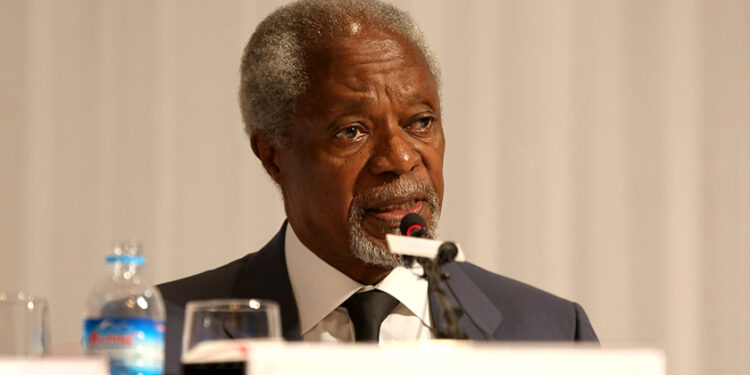YANGON – The Kofi Annan-led Advisory Commission on Rakhine State has urged the National League for Democracy (NLD) government to grant birth certificates and citizenship to children born in Rakhine State in order to prevent increasing statelessness in the region among the Muslim community.
The commission—formed of nine members in Sept. 2016 by the NLD administration—just completed its mandate: to provide recommendations to address long-standing tension and conflict in Rakhine State.
Its final report criticized several aspects of Myanmar’s 1982 Citizenship Law as failing to meet international standards, pointing out that it contradicts the principles of non-discrimination under international law and treaties signed by Myanmar, as well as recently-approved domestic laws, including the 2008 Constitution.
Mr. Annan acknowledged that modifying the citizenship law would be seen as highly sensitive in Myanmar, particularly for the ethnic Rakhine community.
“We are well aware that our recommendations on citizenship and freedom of movement touch on profound concerns of the Rakhine population,” he said on Thursday at a press conference at Yangon’s Sule Shangri-La Hotel.
The former UN Secretary General explained why the commission confronted the controversial issue in the report.
“If [these issues] are left to fester, the future of Rakhine State—and indeed Myanmar as a whole—will be irretrievably jeopardized,” said Mr. Annan.
Further Citizenship Issues
The commission’s final report also encouraged the government to accelerate the national verification process in line with 1982 Citizenship law in Rakhine State and create a transparent strategy and timeline for granting citizenship to those eligible.
In response to frustrations from applicants, the commission recommended that those who have lost their or their parents’ documents should be permitted to submit documentation from another family member, such as an uncle or aunt. The report also emphasized the need to immediately recognize basic rights, such as freedom of movement, for those who are verified as Myanmar citizens.
Many Rakhine State Muslims have been critical of the verification process, citing it as discriminatory. However, Mr. Annan suggested that the Muslim community collaborate further with the government in order to advance the process.
According to the commission’s final report, just 13,000 Muslims—of whom 9,000 are ethnic Kaman—have been recognized as full citizens or naturalized citizens, out of more than one million Muslims who are stateless in the region.
In a statement released on Thursday, James Gomez, Amnesty International’s Director of Southeast Asia and the Pacific, corroborated the recommendations of the advisory commission that the 1982 Citizenship Law be amended, and encouraged the lifting of restrictions on freedom of movement. He also urged the government to implement the suggestions systematically in order to end discrimination and segregation in the region.
“Without concrete action by the authorities to address long-standing grievances and redress decades of violations, people in the region will continue to be trapped in a cycle of deprivation and abuse,” Gomez said.
The Army Weighs In
Before holding a press conference in Yangon, Mr. Annan met with Myanmar Army commander-in-chief Snr-Gen Min Aung Hlaing and State Counselor Daw Aung San Suu Kyi in Naypyitaw Thursday morning. Reporters asked Mr.Annan if he could reveal specific information about his discussion with the military chief but he provided very limited information on the encounter.
Later that evening, an update was posted on the official Facebook page of Snr-Gen Min Aung Hlaing concerning the meeting with Kofi Annan. Military representatives reportedly urged Mr. Annan’s delegation to review some “factually wrong” points and questioned the “impartiality” of the commission’s report.
Snr-Gen Min Aung Hlaing’s statement maintained that citizenship must be granted in line with existing laws and that the national verification process existed in order to examine applicants for “associate citizenship.”
Mr. Annan had encouraged the army chief to allow the media and humanitarian aid agencies access to conflict-torn Rakhine State; Snr-Gen Min Aung Hlaing’s statement said that they had allowed journalists to enter the region, but lamented a lack of accurate reports.
The Office of the Commander-in-Chief also said more emphasis must be placed on Muslims’ refusal to participate in the national verification process.
Overall, the commission, needs to understand the perspective of the military, government, and local Arakanese, Snr-Gen Min Aung Hlaing concluded.
“If the ethnic Rakhine people do not accept [the recommendations], it will be tough to address the issues,” read the army chief’s statement.

















